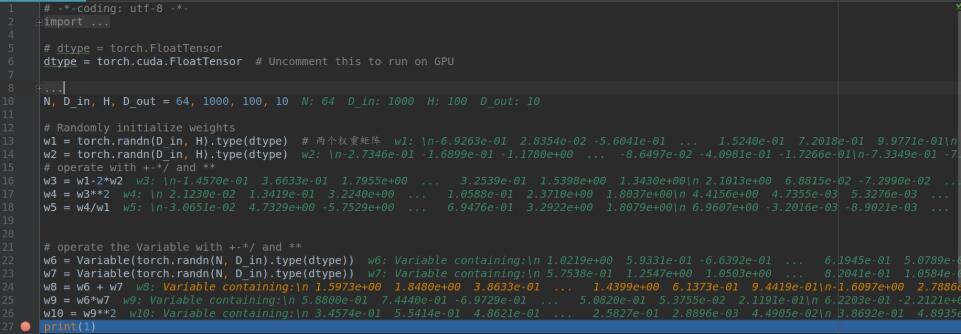жӮЁеҘҪпјҢзҷ»еҪ•еҗҺжүҚиғҪдёӢи®ўеҚ•е“ҰпјҒ
FloatTensorдёҺVariableжҖҺд№ҲеңЁPytorchдёӯдҪҝз”ЁпјҹзӣёдҝЎеҫҲеӨҡжІЎжңүз»ҸйӘҢзҡ„дәәеҜ№жӯӨжқҹжүӢж— зӯ–пјҢдёәжӯӨжң¬ж–ҮжҖ»з»“дәҶй—®йўҳеҮәзҺ°зҡ„еҺҹеӣ е’Ңи§ЈеҶіж–№жі•пјҢйҖҡиҝҮиҝҷзҜҮж–Үз« еёҢжңӣдҪ иғҪи§ЈеҶіиҝҷдёӘй—®йўҳгҖӮ
pytorchдёӯеҹәжң¬зҡ„еҸҳйҮҸзұ»еһӢеҪ“еұһFloatTensorпјҲд»ҘдёӢйғҪз”ЁfloattensorпјүпјҢиҖҢVariableпјҲд»ҘдёӢйғҪз”ЁvariableпјүжҳҜfloattensorзҡ„е°ҒиЈ…пјҢйҷӨдәҶеҢ…еҗ«floattensorиҝҳеҢ…еҗ«жңүжўҜеәҰдҝЎжҒҜ
pytorchдёӯзҡ„dochiз»ҷеҮәдёҖдәӣеҜ№дәҺfloattensorзҡ„еҹәжң¬зҡ„ж“ҚдҪңпјҢжҜ”еҰӮеӣӣеҲҷиҝҗз®—д»ҘеҸҠе№іж–№зӯү(й“ҫжҺҘ)пјҢиҝҷдәӣж“ҚдҪңеҜ№дәҺfloattensorжҳҜеҚҒеҲҶзҡ„дёҚеҸӢеҘҪпјҢжңүж—¶еҖҷйңҖиҰҒеҶҷдёҖдёӘжӯЈеҲҷеҢ–зҡ„йЎ№йңҖиҰҒеҶҷеҫҲй•ҝзҡ„дёҖдёІпјҢжҜ”еҰӮдёӨдёӘfloattensorд№Ӣй—ҙзҡ„зӣёеҠ йңҖиҰҒз”Ёtorch.add()жқҘе®һзҺ°
for step in range(config.total_step): # Extract multiple(5) conv feature vectors target_features = vgg(target) # жҜҸдёҖж¬Ўиҫ“е…ҘеҲ°зҪ‘з»ңдёӯзҡ„жҳҜеҗҢж ·дёҖеј еӣҫзүҮпјҢеҸҚдј дјҳеҢ–зҡ„зӣ®ж ҮжҳҜиҫ“е…Ҙзҡ„target content_features = vgg(Variable(content)) style_features = vgg(Variable(style)) style_loss = 0 content_loss = 0 for f1, f2, f3 in zip(target_features, content_features, style_features): # Compute content loss (target and content image) content_loss += torch.mean((f1 - f2)**2) # square еҸҜд»ҘиҝӣиЎҢзӣҙжҺҘеҠ -ж“ҚдҪңпјҹеҸҜд»ҘпјҢ并且meanеҜ№жүҖжңүзҡ„е…ғзҙ иҝӣиЎҢеқҮеҖјеҢ–йҖ дҪң # Reshape conv features _, c, h, w = f1.size() # channel height width f1 = f1.view(c, h * w) # reshape a vector f3 = f3.view(c, h * w) # reshape a vector # Compute gram matrix f1 = torch.mm(f1, f1.t()) f3 = torch.mm(f3, f3.t()) # Compute style loss (target and style image) style_loss += torch.mean((f1 - f3)**2) / (c * h * w) # жҖ»е…ұе…ғзҙ зҡ„ж•°зӣ®пјҹ
е…¶дёӯf1дёҺf2,f3зҡ„еҸҳйҮҸзұ»еһӢжҳҜVariableпјҢдҪңиҖ…еҜ№е…¶зӣҙжҺҘз”ЁеӣӣеҲҷиҝҗз®—з¬ҰиҝӣиЎҢеҠ еҮҸпјҢ并且用pythonеҶ…зҪ®зҡ„**иҝӣиЎҢе№іж–№ж“ҚдҪңпјҢ然еҗҺ
# -*-coding: utf-8 -*- import torch from torch.autograd import Variable # dtype = torch.FloatTensor dtype = torch.cuda.FloatTensor # Uncomment this to run on GPU # N is batch size; D_in is input dimension; # H is hidden dimension; D_out is output dimension. N, D_in, H, D_out = 64, 1000, 100, 10 # Randomly initialize weights w1 = torch.randn(D_in, H).type(dtype) # дёӨдёӘжқғйҮҚзҹ©йҳө w2 = torch.randn(D_in, H).type(dtype) # operate with +-*/ and ** w3 = w1-2*w2 w4 = w3**2 w5 = w4/w1 # operate the Variable with +-*/ and ** w6 = Variable(torch.randn(N, D_in).type(dtype)) w7 = Variable(torch.randn(N, D_in).type(dtype)) w8 = w6 + w7 w9 = w6*w7 w10 = w9**2 print(1)
еҹәжң¬дёҠи°ғиҜ•зҡ„з»“жһңдёҺйў„жңҹзӣёз¬Ұ

зңӢе®ҢдёҠиҝ°еҶ…е®№пјҢдҪ 们жҺҢжҸЎFloatTensorдёҺVariableжҖҺд№ҲеңЁPytorchдёӯдҪҝз”Ёзҡ„ж–№жі•дәҶеҗ—пјҹеҰӮжһңиҝҳжғіеӯҰеҲ°жӣҙеӨҡжҠҖиғҪжҲ–жғідәҶи§ЈжӣҙеӨҡзӣёе…іеҶ…е®№пјҢж¬ўиҝҺе…іжіЁдәҝйҖҹдә‘иЎҢдёҡиө„и®Ҝйў‘йҒ“пјҢж„ҹи°ўеҗ„дҪҚзҡ„йҳ…иҜ»пјҒ
е…ҚиҙЈеЈ°жҳҺпјҡжң¬з«ҷеҸ‘еёғзҡ„еҶ…е®№пјҲеӣҫзүҮгҖҒи§Ҷйў‘е’Ңж–Үеӯ—пјүд»ҘеҺҹеҲӣгҖҒиҪ¬иҪҪе’ҢеҲҶдә«дёәдё»пјҢж–Үз« и§ӮзӮ№дёҚд»ЈиЎЁжң¬зҪ‘з«ҷз«ӢеңәпјҢеҰӮжһңж¶үеҸҠдҫөжқғиҜ·иҒ”зі»з«ҷй•ҝйӮ®з®ұпјҡis@yisu.comиҝӣиЎҢдёҫжҠҘпјҢ并жҸҗдҫӣзӣёе…іиҜҒжҚ®пјҢдёҖз»ҸжҹҘе®һпјҢе°Ҷз«ӢеҲ»еҲ йҷӨж¶үе«ҢдҫөжқғеҶ…е®№гҖӮ
жӮЁеҘҪпјҢзҷ»еҪ•еҗҺжүҚиғҪдёӢи®ўеҚ•е“ҰпјҒ